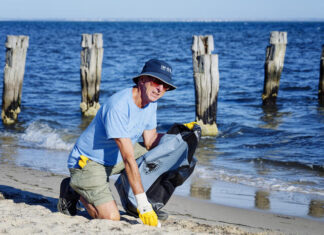Prostate cancer is a major threat to the health of Australian men.
It’s the most commonly diagnosed cancer nationwide, with more than 70 men diagnosed a day, and over the next five years the number of men living beyond a diagnosis will surpass 300,000 according to the Prostate Cancer Foundation of Australia.
With so many long-term survivors and a low rate of death, Australia ranks at the top of the international leaderboard. When it comes to support, however, Australia performs poorly.
In contrast to Australia’s vibrant breast cancer movement, uptake of support for men with prostate cancer has lagged, and men often face their diagnosis alone.
All that is set to change dramatically, thanks to the efforts of a growing movement of prostate cancer support groups Australia-wide.
There are around 130 support groups nationwide who are affiliated with Prostate Cancer Foundation of Australia (PCFA). All are run by volunteers, the majority being men and their partners who have been directly impacted by the disease.
In Victoria there are 29 support groups which have formed a Victorian Council of Prostate Cancer Support Groups.
The Victorian Council is currently working with Prostate Cancer Foundation of Australia (PCFA) on bold plans to raise awareness of the network’s existence, developing a Blue Man campaign to help spread the word.
One of the aims is to raise awareness of prostate cancer and early detection and that the support groups exist as a valuable resource for men diagnosed with prostate cancer.
Chairman of the council, support group convenor and prostate cancer survivor, Peter Gebert, says times are changing.
“Support groups provide men and their families with valuable information and understanding about living with prostate cancer,” he said.
“It’s the kind of advice you can only get from someone who has been through the disease and is qualitatively different to what a doctor or specialist might tell you. Very few Australians understand the impacts of prostate cancer on men’s longer-term mental and physical health and wellbeing, and the side-effects the disease has.”
Too few men know that support groups exist and are often not made aware of the important role support groups can play.
While more than 25,000 Australian men are newly diagnosed each year, and 250,000 Australian men are alive today after a diagnosis, only a fraction of this number ever connect with a support group for help in adjusting to life after a diagnosis.
The statistics are staggering – at least one in three men with prostate cancer will experience clinically significant distress, around one in five will experience anxiety and depression, and high numbers of men will have lower life satisfaction up to 10 years after their diagnosis and initial treatment.
Mr Gebert said support groups are vital to overcoming isolation and neglect, creating a framework for collective action that is essential to our wellbeing and the health of our families and the community.
“The men and women of the network give of their time and experience so that others may have better outcomes if they are touched by this all-too-common disease,” he said.
“Most people attend groups both to learn about cancer and its treatments, and to deal with the emotional, social, practical, and personal effects of having the disease. Many men and their loved ones are looking for information, encouragement, inspiration, hope for survival, or ideas about how to get the best outcome and maintain their quality of life.
“Research has found that people join support groups to overcome a sense of loneliness in illness, and to learn more about research and treatments, as well as taking the opportunity to compare experiences and learn how other people cope with cancer.”
The council has developed an advertisement to highlight the existence of support groups and is circulating a Ppoem about the Blue Man and support.
To join a local support group and get involved in the campaign, go to www.pcfa.org.au/support/find-a-support-group/, www.vicprostatecouncil.org or phone PCFA on 1800 22 00 99.









